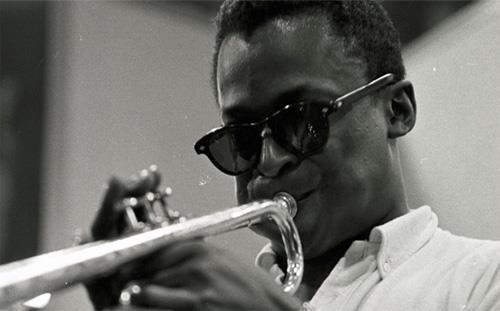
Rich contrasts flowed through the life and music of Miles Davis.
Davis was the consummate cool-guy trumpeter, with fans ranging from Sinatra to rappers. "I don't know any other musician who has played with Charlie Parker and Prince," drummer Vince Wilburn told the Television Critics Association last month.
Davis played in the turbo-charged style of the 1940s then switched to a slower, emotional style. As Farah Griffin, a music historian, put it in a new film airing on PBS: "I want to feel the way Miles sounds."
The film (9 p.m. ET, Tuesday, check local listings) is aptly called Miles Davis: Birth of the Cool. Davis' sound and image were so cool that we might guess he was born in a grotto and raised in a jazz club.
In truth? "He grew up as a dentist's son," said Stanley Nelson, who directed the film. "As someone says in the film, his father was the second-richest African-American in the state of Illinois."
That was in East St. Louis. Just across the river (and across the state line) was the relatively prosperous city of St. Louis, Mo. where Davis studied with the St. Louis Symphony's trumpeter. On the east side, Nelson said, were people facing "a time of segregation and rampant racism" during Davis' 1930s childhood.
Those contrasts molded him, said Marcus Miller, a composer who worked with him on several albums, Davis had "the duality of being a dental surgeon's son (and also) being black in East St. Louis…. He was very proud (and) very determined to fight against racism."
Davis studied at what's now Juilliard but stayed only three semesters. He was more interested in roaming the New York clubs, hearing and joining the greats.
At first, Miller said, he echoed their style. "He was playing fast because it was bebop. (Then) he said, 'OK, enough of that. I'm going to try…something that's more natural for me. And he created this style (that was) just so beautiful."
That changed, too. "He changed styles in his music as he changed band members," said Erin Davis, his son and band member. "It just became this kind of organic life form; it kept changing and changing."
Davis won seven Grammys for jazz and one for rhythm-and-blues. He was inducted into the Rock & Roll Hall of Fame. Duke Ellington called him "the Picasso of jazz," and Sting put him alongside Brahms, as "the geniuses of music."
While to new band members, Miller said, he could be cryptic: "He was scary as hell." And to others, he could be distant. "I think he had a shell that he kept on because growing up in the South and touring the South, I think as an African American,…you had to have a shell."
But colleagues got to know him as a guy with a dry sense of humor. He was a fun guy in his final decades, Miller said. "Working in the studio with him, it was just anecdotes and jokes. He was surprised that we ever got anything done."
Earlier in his career, there were massive problems. Heroin addiction (in the first half of the 1950s) almost ended Davis' career; cocaine and alcohol led to him spending the second half of the '70s as a recluse.
But Davis came back each time and got through other personal problems.
Yes, he divorced three times (once from acting great, Cicely Tyson). Nelson considers Davis' first wife, Frances, now 90, "the star of the film…. She's a trip. She talks about the wonderful love that she had for Miles, but she also talked very candidly about the abuse that she suffered under Miles."
And yes, Davis was once jailed for failing to pay ex-girlfriend Marguerite Eskridge the child support money he owed for their son, Erin, then age 8. But later, Erin says, there were genial, at-home jam sessions with his dad. "Those were fun. When I played in the band, it was a lot more nerve-wracking for me."
The most fun, he said, was following Davis' favorite sport. Using a rusted satellite dish in Malibu, they would find boxing matches. "It was popcorn and Diet Coke" and his dad's ongoing commentary, Erin said. "Those were some of my favorite times with him."
It was low-key fun, and not what we'd expect from the world's coolest jazz cat.